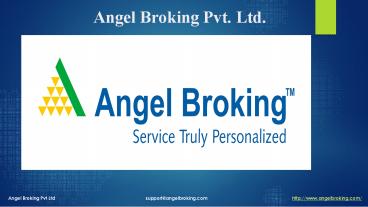What is Equity Share - PowerPoint PPT Presentation
Title:
What is Equity Share
Description:
One of the benefits of trading in the share market is that investors can become partial owners of a company. These shares, offered by companies in return for money, are called equities. For more details visit: – PowerPoint PPT presentation
Number of Views:142
Title: What is Equity Share
1
Angel Broking Pvt. Ltd.
support_at_angelbroking.com
http//www.angelbroking.com/
2
WHAT IS EQUITY SHARES?
Angel Broking Pvt Ltd
support_at_angelbroking.com
http//www.angelbroking.com/
3
What is Equity Shares
- By buying equity shares on share market investors
can become partial owners of a company. These
shares, offered by companies in return for money,
are called equities. - An equity market, also known as the stock market,
is a platform for trading in company shares. It
is the place where buyers and sellers meet to
trade in listed companies.
Angel Broking Pvt Ltd
support_at_angelbroking.com
http//www.angelbroking.com/
4
Understanding an Equity
- Equity consists of funds that shareholders invest
in a company plus a certain amount of profit
earned by them that is retained by the company
for further growth and expansion. - Equity is a primary asset class when it comes to
investing and diversifying ones portfolio.
Angel Broking Pvt Ltd
support_at_angelbroking.com
http//www.angelbroking.com/
5
Trading Equity
- Equity may be traded in the primary market, when
a company makes an Initial Public Offering (IPO)
and new securities may be bought. - Shares that have already been issued are bought
and sold in the secondary market. - Investors may also own private equity, that is,
shares of a company that is still private and not
listed on the bourses.
Angel Broking Pvt Ltd
support_at_angelbroking.com
http//www.angelbroking.com/
6
Benefits of Equity
- Equity, while being a risky investment, offers
historically higher returns than any other asset
class - It is possible to minimize risks and maximize
profits through the use of equity derivatives,
specifically by trading in the Options market - Investing in the equity of reputable companies
has the added benefit of dividends. While giving
them out is not compulsory, established
businesses do pay dividends to increase their
shareholder base.
Angel Broking Pvt Ltd
support_at_angelbroking.com
http//www.angelbroking.com/
7
Types of Equity Markets
- Primary Market
- Every company that proposes to go public must
come out with an initial public offering (IPO).
During the IPO, the company offers a certain
portion of its equity to the public. After the
closing of the IPO, the shares are listed on one
of the stock exchanges. - Secondary Market
- After the listing of the IPO shares, these are
traded on the secondary market. This platform
offers the initial investors an option to exit
their investments. In addition, investors who
failed to procure shares during the IPO can
purchase these from the secondary market.
Angel Broking Pvt Ltd
support_at_angelbroking.com
http//www.angelbroking.com/
8
Equity Market Procedures
- Trading
- The stock exchanges provide an automated
screen-based trading platform that is fully
automated and computerized. - Clearing and Settlement
- The exchanges clear and settle all the trades
that are executed during the trading day. These
exchanges operate well-defined settlement cycles
without any deviations and/or deferments from the
procedures. The trades during the trading session
are aggregated and positions are netted off with
the objective of determining the liabilities of
the trading members. - Under the T2 cycle, buyers receive credits of
the shares in their demat account, and sellers
receive the sale proceeds in the bank accounts
that are linked to the trading account within two
days. - Risk Management
- The stock exchanges have developed a
comprehensive system for risk management. This
system ensures the investors interests and
prevents fraudulent activities by the companies..
Some components of the risk management system
include margin requirements, pay-ins, and
voluntary close-out facilities, and liquid assets.
Angel Broking Pvt Ltd
support_at_angelbroking.com
http//www.angelbroking.com/































